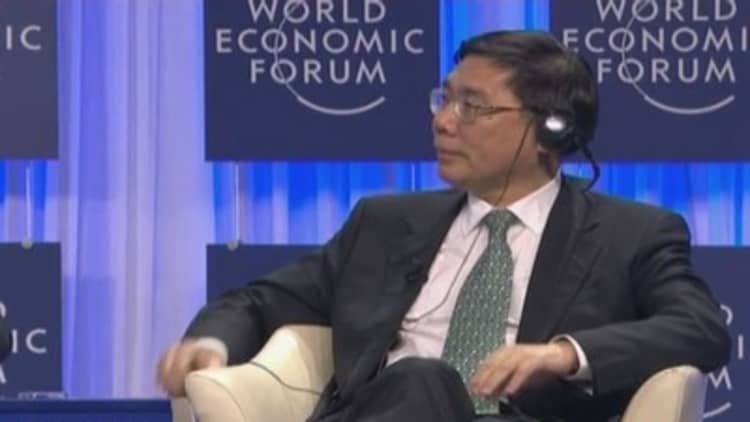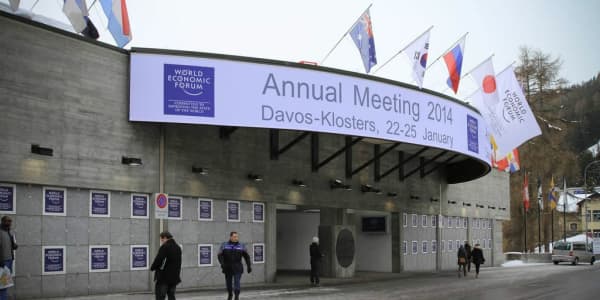
The Chairman of the Industrial and Commercial Bank of China (ICBC), the world's largest bank by assets, told delegates at the World Economic Forum that it was up to Japan whether there would be armed conflict between Tokyo and Beijing.
Responding to a question from CNBC's Geoff Cutmore at a WEF session in Davos, Switzerland, Jiang Jianqing said Japan had been the "Nazi of Asia" over the last 100 years, initiating various aggressive acts including mounting a full-scale invasion of China in 1914 and killing "tens of millions" of Chinese in the Second World War.
"During World War Two, Japan was the Nazi of Asia. So for me, China has been a peace-loving country. China has never invaded or bullied others," Jiang said, speaking through a translator.
"So when you asked whether things would develop into a real conflict, I think it is up to Japan."
(Read more: China bank chief shuts door on burned investors)
A territorial dispute between China and Japan has flared-up in recent months, after the Chinese announced an air defense zone over disputed islands in the East China Sea. Earlier in the week at Davos, Japan's Prime Minister Shinzo Abe said "freedom, human rights and democracy must be assured in Asia," and called for China to respect "international sea law".
Abe himself has sparked controversy in China with his recent visit to the Yasukuni war shrine in Tokyo, which honors Japan's war dead, including convicted Japanese war criminals.
(Read more: Japan's PM issues veiled threat to China over arms race)
Commenting on Abe's speech to delegates at Davos, Jiang said: "So on one hand you do all this, and then you turn around and say, 'I really want to talk to the Chinese. Why don't you guys talk to me?' I do think the key to resolving the problems still lie with Japan itself. In China we have a saying: only the person who tied the knot can untie it."
The ratcheting-up of tensions in China has worried investors. Asia's two largest economies The Japan-China relationship is one of the world's most important bilateral tie-ups in terms of its impact on economic and regional stability. Bilateral trade between the two Asian powers is estimated at some $300 billion, and any deterioration in relations is likely to have significant repercussions for Asia's economy.
Japanese shipments to China tumbled 14.1 percent in September 2012 from a year earlier, the last time there was an escalation in Japan-China tensions. Those tensions led to anti-Japan protests across China and a boycott of Japanese brands.
(Read more: Why investors should watch out for Japan-China tensions)
Also last week, economist Nouriel Roubini warned that there were parallels between the Anglo-German tensions of 1914 and the current dispute in the East China Sea. Tweeting last week, Roubini said "#wef14 many speakers compare 2014 to 1914 when WWI broke out & no one expected it. A black swan in the form of a war between China & Japan?"
Dhara Ranasinghe contributed to the writing of this report.
Follow us on Twitter: @CNBCWorld




